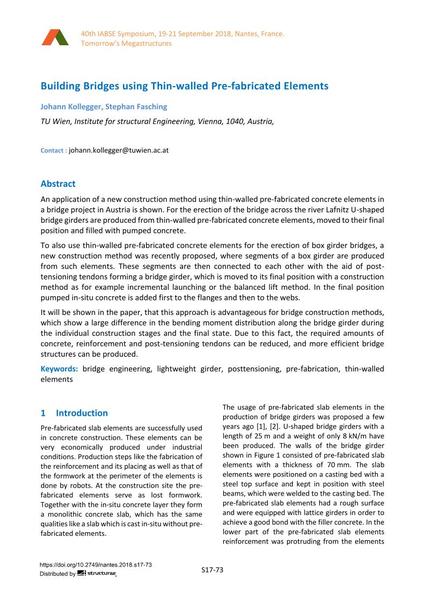Building Bridges using Thin-walled Pre-fabricated Elements

|
|
|||||||||||
Bibliographic Details
| Author(s): |
Johann Kollegger
(TU Wien, Institute for structural Engineering, Vienna, 1040, Austria,)
Stephan Fasching (TU Wien, Institute for structural Engineering, Vienna, 1040, Austria,) |
||||
|---|---|---|---|---|---|
| Medium: | conference paper | ||||
| Language(s): | English | ||||
| Conference: | IABSE Symposium: Tomorrow’s Megastructures, Nantes, France, 19-21 September 2018 | ||||
| Published in: | IABSE Symposium Nantes 2018 | ||||
|
|||||
| Page(s): | S17-73 | ||||
| Total no. of pages: | 6 | ||||
| DOI: | 10.2749/nantes.2018.s17-73 | ||||
| Abstract: |
An application of a new construction method using thin-walled pre-fabricated concrete elements in a bridge project in Austria is shown. For the erection of the bridge across the river Lafnitz U-shaped bridge girders are produced from thin-walled pre-fabricated concrete elements, moved to their final position and filled with pumped concrete. To also use thin-walled pre-fabricated concrete elements for the erection of box girder bridges, a new construction method was recently proposed, where segments of a box girder are produced from such elements. These segments are then connected to each other with the aid of post- tensioning tendons forming a bridge girder, which is moved to its final position with a construction method as for example incremental launching or the balanced lift method. In the final position pumped in-situ concrete is added first to the flanges and then to the webs. It will be shown in the paper, that this approach is advantageous for bridge construction methods, which show a large difference in the bending moment distribution along the bridge girder during the individual construction stages and the final state. Due to this fact, the required amounts of concrete, reinforcement and post-tensioning tendons can be reduced, and more efficient bridge structures can be produced. |
||||
| Keywords: |
pre-fabrication bridge engineering post‐tensioning thin-walled elements lightweight girder
|
||||
